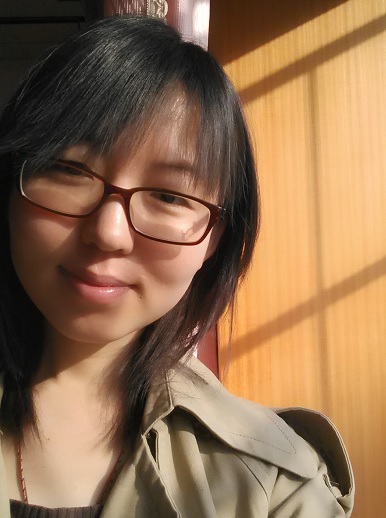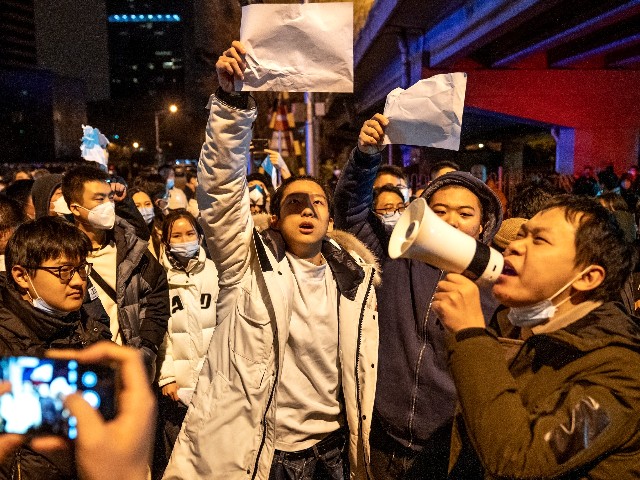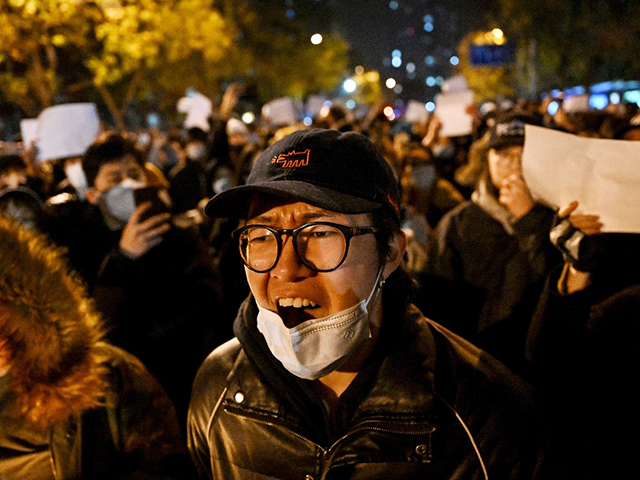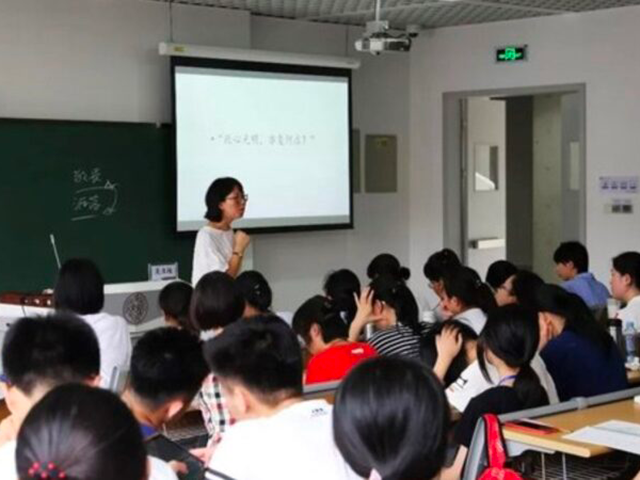Chinese Communist Party officials disappeared a philosophy professor from Tianjin’s Nankai University into a psychiatric facility after she expressed support for anti-regime protests, Radio Free Asia (RFA) revealed Thursday.
RFA noted that Professor Wu Yanan had confirmed her disappearance into a mental hospital on social media this week. A post on her WeChat – a Chinese regime-controlled social media app – account bizarrely stated, in first person, that Wu had suffered an unspecified mental health issue, but she was “basically better” now. RFA’s sources highly doubted that Wu herself wrote the posts.
Wu disappeared in late November during a wave of national protests primarily against China’s repressive “zero-covid” policy, which imposed sprawling lockdowns on entire metropolitan areas and forced thousands into poorly maintained quarantine camps if suspected of carrying Chinese coronavirus. China had begun experiencing increasingly regular protests since the early days of the Chinse coronavirus pandemic in early 2020 but, following the lockdown of Shanghai, the country’s wealthiest city, in April of this year, protests became more widespread and more targeted at the regime, rather than just “public health” measures.

Nankai University’s website lists a woman named Wu Yanan (shown) as a professor of Confucianism in its philosophy department.
During the last weekend of November, Shanghai, Beijing, Chengdu, Zhengzhou, Guangzhou, and other major cities attracted hundreds of protesters. Many held up empty pieces of paper in protest of the regime’s rampant violations against its citizens’ freedom of expression. While individual protests against lockdowns had been occurring for months nationwide, the wave of protests at weekend appeared to have intensified as a result of two new incidents. The first was a deadly fire at a locked-down residential building in Urumqi, the capital of occupied East Turkistan, that reportedly killed dozens of people because firefighters could not reach the building, letting the fire rage for hours from a distance.

Demonstrators hold blank signs and chant slogans during a protest in Beijing, China, on Monday, Nov. 28, 2022. (Bloomberg)
The second triggering event appeared to be the FIFA World Cup, an international soccer tournament held in Qatar. As Qatar enjoys friendly relations with the Chinese government, the regime aired and promoted its soccer games – inadvertently outraging Chinese citizens who saw crowds of thousands of people, the vast majority not wearing sanitary masks, gathering for a mass event unthinkable under Communist Party since the pandemic began.

Protesters march along a street during a rally for the victims of a deadly fire as well as a protest against China’s harsh Covid-19 restrictions in Beijing on November 28, 2022. (Noel CELIS / AFP)
Universities were natural hubs for such protests, prompting authorities, in some cases, to cancel classes early in anticipation of winter break.
Wu, according to RFA, began posting messages supporting her students’ right to express themselves against the regime in November. RFA cited several anonymous students sharing screengrabs of censored social media posts that Wu posted “in which she called on the school to protect its own students, and argued against political reprisals against those who took part in the “white paper” movement that triggered the loosening of [Chinese coronavirus] restrictions this month.”
Wu’s most aggressive statements, according to the report, were condemning university administrators for “betraying the ideals of its founder Zhang Boling” by silencing dissident student voices.
In response to her public statements, RFA reported, Communist Party officials abducted her in a van last month, insisting that she needed to be tested for Chinese coronavirus. She was not heard from until shortly thereafter, posting on social media that she had been taken to a mental hospital where workers were attempting to drug her. She claimed in her final social media post before claiming that she was “better” from a mental health episode that she had run into a bathroom and hid to announce her kidnapping.
That last post named the hospital in question and implored students to find her and get her out.
“She said she was about to be tied up and forcibly injected by a bunch of people, then she hid in the toilet [before they took her phone],” a person RFA identified as Wang Qiang confirmed.
On December 14, Wu’s account posted, “I admit I was under the influence of mental illness a few days ago, when I was suffering from delusions, auditory hallucinations and talking gibberish.”
Wang said he did not believe Wu published that post.
The anti-communist media outlet New Tang Dynasty published screencaps of what appear to be Wu’s last social media posts, and those that got her in trouble. In the posts before her disappearance, Wu wrote, “Who gave you the power to let you forbid us to speak the truth?”
New Tang Dynasty reported that school officials had asked her to delete her posts prior to her disappearance, but she refused.
Nankai University’s website lists a woman named Wu Yanan as a professor of Confucianism in its philosophy department. Wu reportedly taught four classes to undergraduates, including “History of Chinese Philosophy” and “Confucian Philosophy.” The website claims she graduated with a bachelor’s degree from Shandong University in 2007, making her about 37 years old.
Wu’s disappearance is the latest report indicating that China responded to the protests with a pervasive crackdown against known or suspected political dissidents. While Chinese state media largely abstained from commenting on the protests at all, outside of vague references to foreign “sabotage,” it also responded to “zero-covid” outrage by announcing an end to “large-scale” lockdowns and allowing asymptomatic people who test positive for Chinese coronavirus to not be imprisoned in a quarantine camp. These headlines have, in the weeks following the protests, largely drowned out coverage of political resistance.
RFA previously reported that, in addition to protesters being arrested and disappearing into China’s labyrinthine legal system, Party officials had launched an intimidation campaign against defense attorneys considered potential representation for protesters. RFA cited several attorneys who said authorities approached them – in at least one case, raiding their offices – to threaten them out of taking on protesters as clients.
The Chinese Communist Party – like communist regimes spanning back to the Soviet Union – has for years used psychiatric facilities to silence and torture political dissidents. In 2018, RFA reported that officials in major Chinese cities had begun using the euphemism “social maintenance” for the imprisonment of dissidents in mental hospitals following identifying social media posts or public comments that could be interpreted as anti-government. More recently, in August, the NGO Safeguard Defenders published a report accusing the Communist Party of systematically using mental health facilities to imprison dissidents.
“Locked up, many patients were physically and mentally abused. They were subjected to painful electroconvulsive therapy, often without anesthesia;” the report detailed, “tied to their beds where they were left for hours to lie humiliated in their own waste; and beaten and isolated (contact with their family or lawyers through visits or phone calls was blocked).”

COMMENTS
Please let us know if you're having issues with commenting.